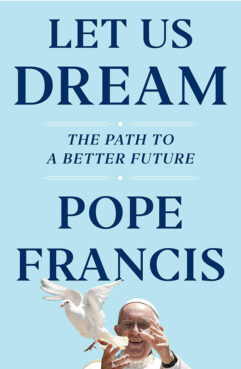
VATICAN CITY (RNS) — Just weeks after Pope Francis issued “Fratelli Tutti,” a 400-page encyclical on themes of universal love and economic injustice, he is releasing a slimmer volume, “Let Us Dream: The Path to a Better Future,” reflecting on the pandemic and its aftermath, with an eye fixed on the United States.
In both his encyclical and the 160-page new book, Francis looks at the inequalities and turmoil generated by COVID-19, but “Let Us Dream” focuses on grassroots movements that have generated hope and fraternity, working against those who insist on enforcing borders and partisan enmity.
In the George Floyd protests, as well as marches born out of the environment and the #MeToo movement, Francis sees an “awakening” that rekindles hope in a fragmented world.
The title of the book is drawn from God’s words to the biblical prophet Isaiah: “Come let us talk this over. Let us dare to dream.” It was written in conversation with papal biographer and journalist Austen Ivereigh.
The pontiff and Ivereigh began the book not long after Francis delivered the annual Urbi et Orbi address at the height of Italy’s coronavirus crisis last March. Standing in an empty St. Peter’s Square in the rain, Francis exhorted the world of faith to stand together against injustice and to help the most vulnerable.
Ivereigh worked from audio recordings of Francis’ musings as the U.S. election season was conducted amid violent protests. The book, divided into three parts — See, Choose and Act — contains his comments on populism, racism, immigration and the environment.
The book is “a way for the English-speaking world to hear from him,” Ivereigh told Religion News Service on Tuesday (Nov. 24).
While the book was written to apply to political leaders around the globe, “it’s very hard not to think about President Trump at the time,” Ivereigh said.
“In some cases, governments have tried to protect the economy first, maybe because they didn’t understand the magnitude of the illness, or because they lacked the resources,” Francis writes. “Those governments have mortgaged their people.”

“Let Us Dream: The Path to a Better Future” by Pope Francis. Courtesy image
Francis also blames some media outlets for convincing people “that foreigners are to blame, that coronavirus is little more than a little bout of flu, that everything will soon return to what it was before, and that restrictions necessary for people’s protection amount to an unjust demand of an interfering state,” the pope writes.
This is also true for “certain so-called Catholic media that claim to be saving the Church from itself,” he adds.
Though Francis has been criticized for not wearing a mask in public, including at a recent visit with NBA players, he calls out those who protest COVID-19 safety measures and travel restrictions. Priests and laypeople give a bad example, he writes, by turning “into a cultural battle what was in truth an effort to ensure the protection of life.”
Injustices such as Floyd’s death, the crimes exposed by the #MeToo movement or the lack of regard for the environment are all born from the same malady, in Francis’ diagnosis: abuse of power.
While he supports the spirit of this summer’s protests, Francis draws the line at tearing down statues, such as those depicting St. Junipero Serra in California. Francis writes that “for there to be true history there must be memory.” Destroying memorials risks “committing other injustices, reducing a person’s history to the wrong they did,” he writes.
After explaining his preference for what he calls “the synodal approach” to discerning the truth, action should also be conducted in communion with others, Francis writes, citing the United States motto “E pluribus unum.”
“To know ourselves as a people is to be aware of something greater that unites us, something that cannot be reduced to a shared legal or physical identity,” Francis writes. “We saw this in the protests in reaction to the killing of George Floyd, when many people who otherwise did not know each other took to the streets to protest, united by a healthy indignation.”
Just as slavery and the death penalty were widely accepted for centuries, Francis says, today also humanity must learn to recognize injustice, especially abortion, xenophobia and pollution.
The pope encourages governments and his own church to commit to “the three L’s”: Land, Lodging and Labor. This means committing to the promotion and care for creation, humanizing urban environments and prioritizing access to work.
In this context Francis returns to the idea of universal basic income, reduced working hours and adjusted salaries.
“Politics can once again be an expression of love through service,” Francis concludes. “By making the restoration of our peoples’ dignity the central objective of the post-Covid world, we make everyone’s dignity the key to our actions.”
